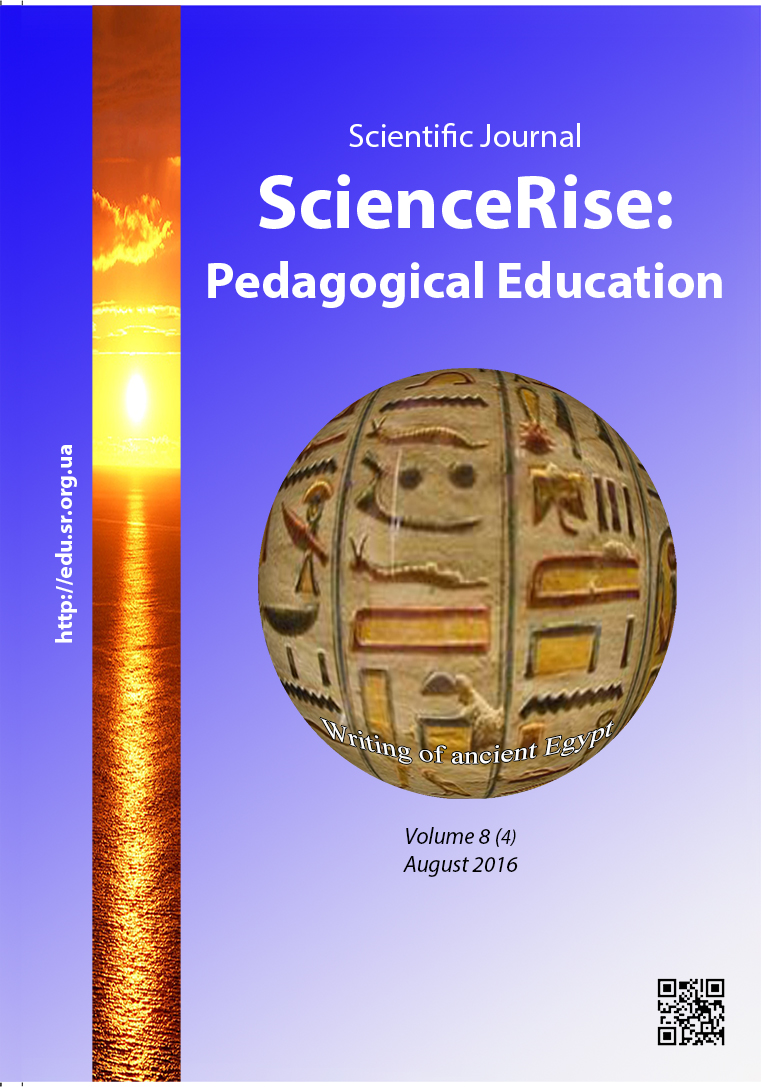The system of formation of pupils’ social responsibility in microenvironment: theoretical aspect
DOI:
https://doi.org/10.15587/2519-4984.2016.76423Keywords:
social responsibility, microenvironment, pupil, component, object, subject, methodological approachAbstract
The topicality of problem of pupils’ social responsibility as an integrative personal quality that determines the schoolchild’s behavior on the base of understanding and acceptance of the social norms, values and ability to assess the consequences of own actions and to be responsible for them is caused by the growth of importance of social values in the world space. Microenvironment is just that upbringing potential where these processes are expanded and developed.
The essence of formation of pupils’ social responsibility in microenvironment is elucidated on the base of analysis of the system, environmental, personal-activity, factor, cultural, acmeological, synergetic approaches.
The system of formation of pupils’ social responsibility is understood as a totality of interconnected structural components, directed on attaining the certain result (to take responsibility consciously) that at the same time act as a single whole, creating the substructure of social environment. The system is presented by the purposeful (aim, tasks, principles, result), content (directions of formation), technological (forms, methods, stages), subject-object (subjects, objects), microenvironmental (internal, external) components and has the following properties: integrity, emergence, purposefulness, expedience, structure, hierarchy, synergism, informativeness, openness, balance, steadiness, dynamism, reliability, conceptuality
References
- Osokina, Ju. S. (2006). Vidpovidal'nist' social'nogo sub’jekta: filosofs'kyj analiz. Kyiv, 24.
- Lynovyc'ka, O. (2011). Sociokul'turna vidpovidal'nist' osvity. Kyiv: Vyd-vo NPU imeni M. P. Dragomanova, 19.
- Radchenko, O. V., Savchenko, I. G. (2008). Cinnisnyj vymir social'noi' vidpovidal'nosti v demokratychnij derzhavi. Kharkiv: Vyd-vo HNUVS, 200.
- Vasjanovych, G. P. (2002). Moral'no-pravova vidpovidal'nist' pedagoga (teoretyko-metodologichnyj aspekt). Lviv: Vyd-vo «SPOLOM», 232.
- Mal'ko, A. M., Mal'ko, A. O. (2004). Social'no-pedagogichna dijal'nist' u zakladah osvity. Kharkiv: Krok, 83.
- Vasylenko, O. M. (2015). Social'na vidpovidal'nist' u dysertacijnyh doslidzhennjah social'no-pedagogichnoi' sprjamovanosti. Pedagogika ta psyhologija. Kharkiv: Vyd-vo TOV «Shhedra sadyba pljus», 48, 260.
- Muzdybaev, K. (1983). Psihologija otvetstvennosti. Leningrad: Nauka, 240.
- Bertalanfi, L. fon.; Sadovskogii, V. N., Judin, Je. G. (Eds.) (1969). Obshhaja teorija sistem – kriticheskij obzor. Issledovanija po obshhejteorii sistem. Moscow: Progress, 23–82.
- Ujomov, A. I. (1978). Sistemnyjpodhod i obshhajateorija sistem. Moscwo: Mysl', 272.
- Il'ina, T. A. (1972). Sistemno-strukturnyj podhod k organizacii obuchenija. Moscow: Znanie, 72.
- Kuz'mina, N. V. (Ed.) (1980). Metody sistemnogo pedagogicheskogoissledovanija. Leningrad: Izd-vo Leningr. un-ta, 172.
- Anohin, P. K. (1980). Uzlovye voprosy teorii funkcional'nyh sistem. Moscow: Nauka, 435.
- Andrejeva, M. O. (2013). Rozvytok social'noi' kompetentnosti studentiv z osoblyvymy potrebamy u vyshhomu navchal'nomu zakladi. Slovjans'k, 22.
- Chernec'ka, Ju. I. (2016). Teorija i praktyka social'no-pedagogichnoi' roboty z resocializacii' narkozalezhnyh v umovah reabilitacijnyh centriv. Starobil's'k, 46.
Downloads
Published
How to Cite
Issue
Section
License
Copyright (c) 2016 Ольга Миколаївна Василенко

This work is licensed under a Creative Commons Attribution 4.0 International License.
Our journal abides by the Creative Commons CC BY copyright rights and permissions for open access journals.
Authors, who are published in this journal, agree to the following conditions:
1. The authors reserve the right to authorship of the work and pass the first publication right of this work to the journal under the terms of a Creative Commons CC BY, which allows others to freely distribute the published research with the obligatory reference to the authors of the original work and the first publication of the work in this journal.
2. The authors have the right to conclude separate supplement agreements that relate to non-exclusive work distribution in the form in which it has been published by the journal (for example, to upload the work to the online storage of the journal or publish it as part of a monograph), provided that the reference to the first publication of the work in this journal is included.







